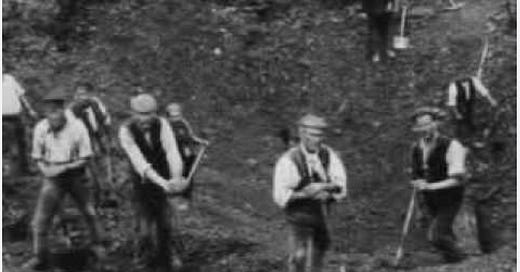By JOHN LEAKE
Yesterday I briefly participated in a St. Patrick’s Day Parade as I made my way to the Bethel Christian Fellowship Church in Rochester, New York, where Dr. Peter McCullough, Steve Kirsch, VAERS whistleblower Deborah Conrad, Brownstone Institute President Jeffrey Tucker, and lawyer Bobby Ann Cox gave presentations. While we were signing books, a young, strapping man told Dr. McCullough that his employer is still mandating COVID-19 vaccines and that he’d just received notice that he would soon be fired if he didn’t comply. “What should I do?” he asked.
Dr. McCullough replied:
Look your boss straight in the eye and tell him you won’t comply. Tell him you aren’t afraid and that you won’t be pushed around. Our country needs strong young men like you to stand up to tyrants like your employer.
After the event we drove to Buffalo and had dinner at a restaurant near where the Erie Canal flows into Lake Erie, and I pondered the guys who dug it—all 363 miles of it, between Albany and Buffalo, in the years 1817-1825. When the project was proposed to President Jefferson in 1808, he declared it was “little short of madness,” and refused to federally fund it. None of the engineers had any formal training, and the toughest western stretch was dug mostly by Irish immigrants who’d just arrived in New York.
This was before dynamite and the steam shovel were invented, so the poor Irish fellows had to do it all with primitive, dangerous black powder explosives and by hand. As the work progressed through the Montezuma marshland in the Finger Lakes:
Thousands of Irish laborers were sickened or died in the swamps from what was called “Genesee fever,” but which was actually malaria. Irish immigrant labor gradually overtook local workers and anti-Irish, anti-Catholic sentiment swelled along the canal construction route. The Irish workers were often paid in whiskey in addition to (or sometimes in place of) their meager wages of $12 a month. While brawling and skirmishes with locals were a frequent problem, the Irish workers proved willing to do the dirtiest and most dangerous work, including blasting rock with unpredictable black powder.
Historian Gerard Koeppel, author of Bond of Union: Building the Erie Canal and the American Empire, quotes the lyrics of a popular Irish work song: "We are digging a ditch through the mire, Through the mud and the slime and the mire, dammit! And the mud is our principal hire; In our pants, down our boots, down our necks, dammit!"
When the canal was finally completed it became an instant commercial success that lowered the cost of grain transported from Ohio to New York City by 90%.
I wonder what those poor Irish laborers would think of our country today. What would they say if someone told them they possess “white male privilege” and are part of America’s “white male patriarchy”?
19th century Irish immigrants were often treated as second class citizens and worked to death in massive public works like the Erie Canal and the Brooklyn Bridge 45 years later, but their descendants seem to have no interest in joining today’s Cult of Victimhood.
Dr. McCullough is right. We need strong men and women to stand up to the creeping tyranny in our country—especially in New York State and California. A Constitutional Republic that took two centuries to build can be lost in a few years if the nation’s prudent grownups don’t oppose destructive ideologies that can suddenly sweep across the land like a contagion. As the great Irish poet William Butler Yeats put it:
Turning and turning in the widening gyre
The falcon cannot hear the falconer;
Things fall apart; the centre cannot hold;
Mere anarchy is loosed upon the world,
The blood-dimmed tide is loosed, and everywhere
The ceremony of innocence is drowned;
The best lack all conviction, while the worst
Are full of passionate intensity.






Very well said. Just imagine how events would have turned out differently had more strong principled people had just said NO.
I wanted to go to Rochester to hear steve kirsch but could go. I am glad to meet dr McCullough today in Buffalo. I found him very approachable and down to earth, just like his podcast. I can’t wait for the event to begin